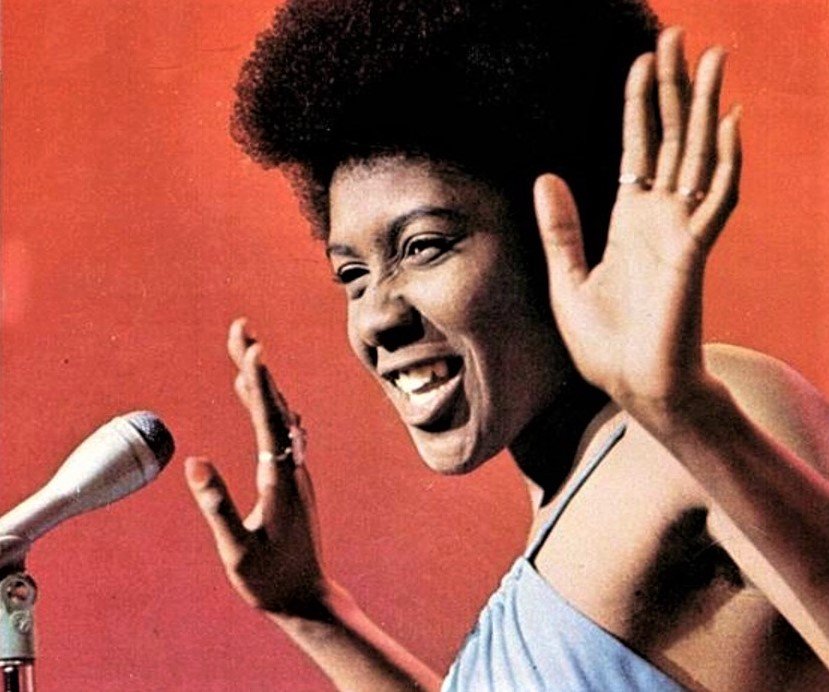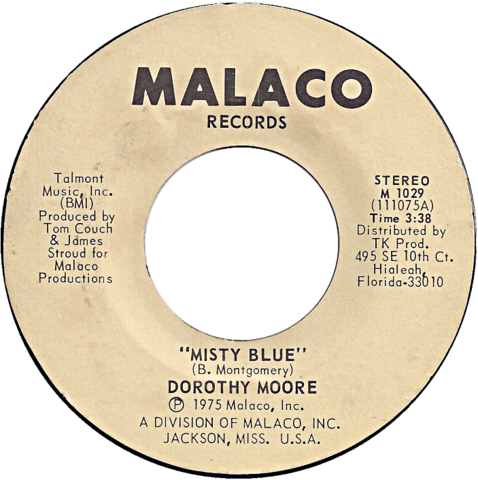DOROTHY MOORE

A four-time Grammy nominee, Dorothy Moore recorded the last Southern Soul record to do well on the charts before Disco and Funk took over Black music.
She was born in Jackson, Mississippi, on October 13, 1947. Her father sang with the famous gospel quintet, the Five Blind Boys of Mississippi At age three, Moore’s mother realized that her toddler had singing talent and so bought her musical instruments and took her to gospel programs. By age five, Moore was singing with the New Stranger Home Baptist Choir and eventually became a soloist. She later sang in talent shows at the Alamo Theater, winning first prize numerous times.
After she graduated from high school in 1965, Moore attended Jackson State University and formed a group called the Poppies with two other female students. They recorded for Date Records, an Epic subsidiary, and reached #56 on the Billboard Hot 100 with “Lullaby of Love” in the spring of 1966. Moore subsequently recorded solo, but with little commercial success, for the Avco, GSF, and Chimneyville labels.
Her career didn’t really take off until Moore signed with Malaco Records in the mid-1970s and recorded “Misty Blue.” The heartbreak ballad had begun life in a 1966 recording by Wilma Burgess, who took it to #4 on the Billboard Country chart. The following year, Eddy Arnold’s version hit #2 Country and #57 pop. (It also charted in Canada.) The first soul version of “Misty Blue” was by Joe Simon, who cut the song in 1972.
It was Tommy Couch, the owner of Malaco, who thought “Misty Blue” was perfect for Dorothy Moore. Per the singer, “We did that record in one take. I recorded it just like I did any other. I didn’t say, ‘This is a hit.’ I never saw it coming.” Malaco shopped “Misty Blue” around to the major labels, none of whom picked it up for national distribution. So Couch used the last of his cash reserves to press the single himself.
The risk paid off. “Misty Blue” became a solid smash, hitting #2 on the Billboard Soul chart and #3 pop in the spring of 1976. It was also the last Southern Soul record to peak that high as the beat-laden genres of Disco and Funk were taking over Black music.
In the early ‘80s, Moore took a hiatus from recording but returned in 1986 with a gospel album, Givin’ It Straight to You, on the Nashville-based Rejoice label. She then recorded two secular albums for Volt Records. By 1990, Moore was back on Malaco and had her final charted single, “All Night Blue.” She remained with Malaco until 2002, when she started her own label, Farish Street.
Dorothy Moore has received four Grammy nominations. She also serves on the National Advisory Board of the Mississippi Grammy Museum and has been inducted into the Mississippi Musicians Hall of Fame. In 2015, Moore was inducted into the Official Rhythm & Blues Music Hall of Fame in Clarksdale, Mississippi.
Charted singles:
“Cry Like a Baby” (1973) R&B #79
“We Can Love” (duet with King Floyd, 1975) R&B #76
“For Old Time [sic] Sake” (1975) R&B #53
“Misty Blue” (1976) R&B #2, Pop #3
“Funny How Time Slips Away” (1976) R&B #7, Pop #58
“I Believe You” (1977) R&B #5, Pop #27
“We Should Really Be in Love (duet with Eddie Floyd, 1977) R&B #74
“1-2-3 (You and Me)” (1978) R&B #93
“Let the Music Play” (1978) R&B #50
“Special Occasion” (1978) R&B #30
“With Pen in Hand” (1978) R&B #12, Pop #101
“(We Need More) Loving Time” (1979) R&B #81
“Talk to Me / Every Beat in My Heart (Medley)” (1980) R&B #87
“What’s Forever For” (1982) R&B #90
“All Night Blue” (1991) R&B #75

